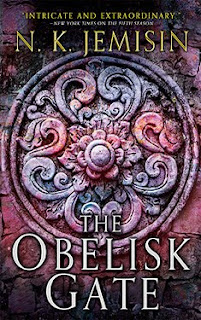The Just City by Jo Walton
Published: Tor, 2015
Series: Book 1 of the Philosopher Kings
Awards Nominated: Prometheus Award
The Book:
“Created as an experiment by the time-traveling goddess Pallas Athene, the Just City is a planned community, populated by over ten thousand children and a few hundred adult teachers from all eras of history, along with some handy robots from the far human future--all set down together on a Mediterranean island in the distant past.
The student Simmea, born an Egyptian farmer's daughter sometime between 500 and 1000 A.D, is a brilliant child, eager for knowledge, ready to strive to be her best self. The teacher Maia was once Ethel, a young Victorian lady of much learning and few prospects, who prayed to Pallas Athene in an unguarded moment during a trip to Rome--and, in an instant, found herself in the Just City with grey-eyed Athene standing unmistakably before her.
Meanwhile, Apollo--stunned by the realization that there are things mortals understand better than he does--has arranged to live a human life, and has come to the City as one of the children. He knows his true identity, and conceals it from his peers. For this lifetime, he is prone to all the troubles of being human.” ~WWEnd.com
I’ve been meaning to read The Just City, for quite a while, so I jumped on the chance to pick it up from Tor.com’s ebook club a few months back (http://ebookclub.tor.com/). I have liked everything that I have read by Jo Walton, and the topic of this one piqued my interest. I enjoy reading about the process of building a society within a fictional universe. This novel was very satisfying in that respect, and it left me eager to read The Philosopher Kings and Necessity.
My Thoughts:
All of us (who are honest) can agree that there are no perfect societies on Earth. I think every person acts, to some extent, to shift society toward their concept of the ideal arrangement. This is a slow process, and muddled by the fact that people have very different ideas of how things should change. That’s why, to me, the lure of building a new society from scratch is undeniable. Athena’s group of mentors take Plato’s Republic as their model, and attempt to build it on an isolated island that will not endure in the future. While I don’t agree with many of the details of Plato’s Republic, I like the emphasis on creating a just society that allows each person to become their best self. The Just City takes this idea and considers how it might work when implemented by and for actual people. The City can’t be truly separate from the world, since the mentors are shaped by their own times and experiences, and the ten-year-olds are certainly not “blank slates”. Even if it were somehow kept pure from the influence of other societies, people are messy, emotional, and confusing creatures. It was fascinating to see how this planned society fared when taking human nature into account.
The novel covers many aspects of human experience through an engaging mix of viewpoint and minor characters. Maia provides eyes into the group of mentors, people who are united in purpose but not in their prejudices. Many of the men from older civilizations struggle with accepting women as equals, which has some frustratingly predictable consequences. Among the children, Simmea represents the kind of person best suited to the education the City offers. She’s brilliant, driven, and eager to become her best self. I also appreciated that she was unattractive, and that this did not harm her self-esteem or others’ estimation of her worth. In her cohort is Apollo, who has a really personable, amusing narrative voice. I enjoyed his outsider’s perspective on the society, and his exploration of the experience of being mortal. The concept of the novel really depends on having characters that feel authentic, and I feel that it succeeds on this count.
Central to Apollo’s arc is developing an understanding of volition and equal significance, and this is echoed in many places in the development of the City itself. The mentors intend to create a just society, but they begin it with a denial of choice. They buy children from slave markets, with the justification that they will have a better life. This may be true, but it also leaves some children angry with being ripped from their world and taken to a society that is planned to have no future. Not everyone wants their life to be part of an experiment. The society attempts to regulate many things that most of us would consider personal, such as sexual and non-sexual relationships. While their intentions may be honorable, the mentors are treating the children as subjects to be managed, not as people with equal significance. I enjoyed seeing how this conflict between ideals and execution would influence the development of the City. I think The Just City came to a natural conclusion, but there is still clearly story left to tell in this universe.
My Rating: 5 / 5
I am a fan of Jo Walton’s work, and The Just City is my favorite of her novels so far. The idea of building a society based on Plato’s Republic intrigued me, and the novel gave a fascinating look into how the experiment might play out when enacted by real people. Apollo, Simmea and Maia each brought a valuable perspective on the planned society, and I especially enjoyed Apollo’s conversational narration. One of the central ideas is the importance of choice and of considering others equally important to oneself. It was interesting to see how this both drove and contradicted the efforts to build a more just society. The ending makes it clear that this phase of the story is complete, but that there is more to tell. I am curious as to see where the citizens of the Just City will go from here!

